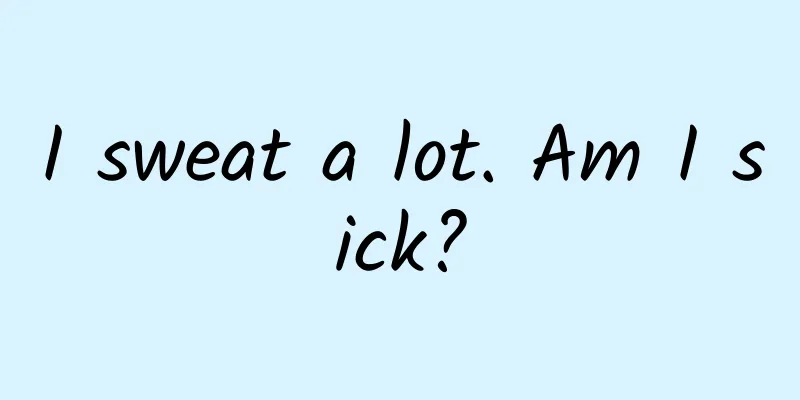I sweat a lot. Am I sick?

|
Review expert: Zhang Yuhong, chief physician of the Department of Dermatology, Zhengzhou Central Hospital Affiliated to Zhengzhou University As soon as summer comes, I start to sweat profusely when I move a little, and I envy those people who don't sweat no matter how much they move. Some say that sweating too much is a sign of physical weakness, but others say that not sweating is not good for the body's detoxification. So, which of these claims is more reliable? How much sweat is good? Source: pixabay 1 Why do people sweat? Under normal circumstances, the human body temperature is maintained at around 37 degrees Celsius. When the external environment temperature changes or when exercising, the body temperature will rise. At this time, the skin needs to be used to dissipate heat to balance the body temperature. Sweating through sweat glands is an important way to regulate body temperature. The human body has about 4 million sweat glands, which are divided into apocrine sweat glands and eccrine sweat glands . Apocrine sweat glands are mainly distributed in the armpits, breasts and perineum, while eccrine sweat glands are distributed throughout the body, concentrated in the palms and soles of the feet. The development and location of each person's sweat glands are different, and coupled with different basal metabolism, the amount of sweat and the location of sweating vary from person to person. For example, some people sweat more on their foreheads, while some people sweat more under their armpits. Source: Baidu Encyclopedia As a metabolic product, sweat is discharged from the body and takes away excess heat. Therefore, the function of sweating is to dissipate heat and maintain the balance of body temperature. As for the folk saying that "sweating detoxifies", it is not rigorous . Sweat is composed of 99% water and 1% other components, such as iron, sodium, calcium, potassium, and metabolic waste such as urea nitrogen. In other words, sweating mainly excretes water, not "toxins" in the chemical sense. As for the unpleasant smell or even body odor after some people sweat, it is not body odor, but the smell produced by sweat contacting the skin and being decomposed by bacteria on the skin. 2 Excessive sweating vs. less sweating Generally speaking, an adult sweats 500 to 1000 ml a day. High temperatures or exercise can increase sweating, and in summer the amount of sweat can reach 1500 to 2000 ml, which is about the amount of 3 to 4 bottles of mineral water. However, due to the different number and distribution of sweat glands in each person, sweating in high temperatures and after exercise varies, and it is normal as long as there is no discomfort in the body. Source: pexels In addition to the above two factors, there are also physiological factors that affect sweating. The following are some common situations: Obesity-related sweating: Obese people have thicker fat and dissipate heat more slowly, so they sweat more. Gustatory sweating: When consuming spicy food, the spiciness will stimulate the sympathetic nerves and cause people to sweat. Psychological sweating: The common saying "sweating" refers to this situation. When people are nervous, anxious or excited, the small sweat glands are stimulated by certain nerves, which can promote the secretion and discharge of sweat. Sweating during pregnancy: After a woman becomes pregnant, her estrogen level is higher, her basal metabolism speeds up, and her body temperature rises, leading to increased sweating. The above sweating conditions are all normal metabolic reactions, and there is no problem as long as you replenish water in time after sweating. However, there are some sweating conditions that may indicate certain diseases. 3 Abnormally excessive or insufficient sweating Common conditions that cause abnormal sweating include diabetes, hyperthyroidism, tuberculosis, hypertension, tumors, congestive heart failure, etc. However, such conditions are accompanied by other uncomfortable symptoms while causing abnormal sweating, such as fever, cough, etc. If there are no obvious symptoms, but you still sweat a lot in a mild temperature or when you are not exercising, this is called "false sweating" . Some people sweat at night when they sleep, which is called "night sweats". If there is any abnormality, it is recommended to go to the hospital for examination. Some people have a "less sweating" physique. They rarely sweat and do not feel any discomfort. This may be because they have fewer or underdeveloped sweat glands. However, if the amount of sweating suddenly decreases in hot weather or after exercise, you should be careful that it may be caused by diseases, such as some skin diseases, such as ichthyosis, reflex dermatitis, etc., or nerve damage and Horner's syndrome. Such patients may suffer from systemic anhidrosis or less sweating in hot weather or after exercise. It is recommended to go to the hospital for examination as soon as possible. Therefore, the amount of sweating can reflect the health status of the body to a certain extent. Everyone can pay attention to their own sweating in daily life to prevent physical diseases. 4 How to deal with excessive sweating in summer In the hot summer, many people sweat profusely when they go out. Excessive sweating causes the body to lose water and electrolytes, which may cause irritability, fatigue, palpitations, and redness. Some elderly people are also prone to blood vessel blockage and sudden myocardial infarction. Therefore, you should take some actions after sweating in the summer. The specific methods are as follows: 1. Drink more electrolyte water As mentioned above, sweat is basically water, so after sweating a lot, you need to replenish water in time. Be careful not to drink too much just because you are thirsty. It is recommended to drink in small sips and multiple times; Source: pexels 2. Eat more foods rich in potassium and sodium Sweating will cause the loss of electrolytes. Potassium can regulate intracellular osmotic pressure and acid-base balance, maintain myocardial function, and keep the heartbeat regular. You can replenish it by eating green leafy vegetables or fruits. The lost sodium can be replenished by drinking light salt water. This is why you should drink some mineral drinks after running. 3. Cool down in time When the body temperature rises and sweating is severe, in addition to replenishing water, you can also perform physical cooling, such as using a fan, washing your hands and face, etc., to reduce water loss from the root. Wait a few minutes after sweating and take a shower to make your body feel more comfortable. Source: pixabay Sweating a little in the summer is actually good for the body. You can prepare to exercise and sweat more to make your body healthier. Of course, you should also be careful not to over-exercise on hot days and be careful of heatstroke! |
>>: "Food Safety Guide" Series | Can children eat ice cream? Keep these points in mind!
Recommend
Pinduoduo has attracted 300 million users in just two and a half years. How did it grow so explosively?
In the market landscape dominated by Alibaba and ...
Understanding "promotion" and "marketing"
When you need to produce a feasible promotion pla...
Peony is a condiment in the past.
Peonies fade and peonies bloom, which is the time...
In the world created by “screens”, the word “natural” is becoming less and less common?
Leviathan Press: The author of this article, Alan...
My boyfriend gave me a blessing from an African muscle man
Since its establishment, Lao Wang's placard-h...
Tiangong Space Station: Opening a new era of Chinese "space settlement"
On December 9, 2021, Wang Yaping (left) and Ye Gu...
When operating a website, consider user loyalty first, then think about product awareness!
When many novice website operators get a website ...
How does the epidemic affect the advertising industry?
The impact of the epidemic on industries such as ...
The product manager of NetEase Cloud Music personally tells: practical experience in each product development stage of Cloud Music!
The topic I want to share with you today is "...
Weightlifting vs. Strongman: Who is the King of Strength?
On August 7, local time, Chinese athlete Li Fabin...
Customer acquisition methodology: How to attract new users at a lower cost?
No matter it is an emerging industry like bike-sh...
"The Best Celebrity" is out of the circle! How do Internet celebrities attract attention?
This year, the comedy film "Hot Man" ha...
Announced dead: There may be only two Yangtze giant softshell turtles left on Earth
According to Vietnamese media reports, on April 2...
Why do people in Tianjin like to say this number the most?
In Tianjin You must have heard the number "7...
Take a look at other people’s new marketing promotion methods for the Qixi Festival!
Take a look at other people's new marketing m...
![niaoniao's 18th C4D+OC rendering course will end in January 2022 [HD quality with materials]](/upload/images/67cbff58eb0ad.webp)








